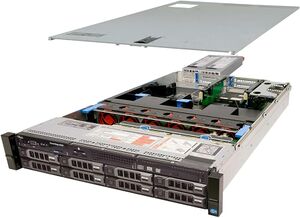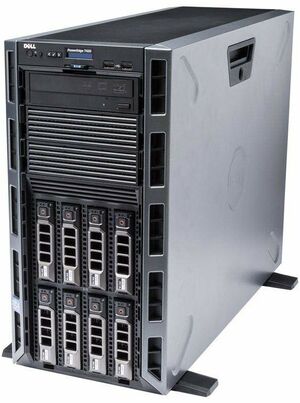We are still actively working on the spam issue.
Difference between revisions of "Home Server/Used Servers"
| Line 3: | Line 3: | ||
[[File:Dell-poweredge-t320.jpg|thumb|right|The Dell R320 is a compact tower server.]] | [[File:Dell-poweredge-t320.jpg|thumb|right|The Dell R320 is a compact tower server.]] | ||
{{Tip|Rule of thumb: don't buy anything over 8-10 years old. Always research the hardware before making an offer.}} | {{Tip|Rule of thumb: don't buy anything over 8-10 years old. Always research the hardware before making an offer.}} | ||
| − | Be aware though, rackmount servers are usually pretty loud, and many older Xeons can be extremely energy inefficient. For most popular brands/configurations there are YouTube videos specifically for the sound. Search for "R720 noise" in YouTube and you will find videos of people putting their microphones up to them so you can assess the noise levels for yourself and your application. Don't let the noise deter you unless you plan to have this server in a living space in your home. | + | Be aware though, rackmount servers are usually pretty loud, and many older Xeons can be extremely energy inefficient. For most popular brands/configurations there are YouTube videos specifically for the sound. Search for "R720 noise" in YouTube and you will find videos of people putting their microphones up to them so you can assess the noise levels for yourself and your application. Don't let the noise deter you unless you plan to have this server in a living space in your home. |
| + | |||
| + | |||
===Pros=== | ===Pros=== | ||
| Line 22: | Line 24: | ||
* Some Very old (8-10 years) high end CPUs actually perform worse than modern low-to-mid end CPUs. | * Some Very old (8-10 years) high end CPUs actually perform worse than modern low-to-mid end CPUs. | ||
| + | ==Server Noise== | ||
| + | |||
| + | Rackmount servers are designed with one goal in mind: maximum performance. This means things like noise and power efficiency are completely ignored. Remember, these types of servers are designed to be racked in dedicated rooms away hidden from people. | ||
| + | |||
| + | A good rule of thumb is that the smaller a server is, the louder its fans will be. Servers also tend to store their hard drives outside their chassis, whereas consumer desktops hide their drives internally to reduce noise. If you are concerned about noise but still want a server, look at tower servers. These tend to be designed with human proximity in mind (they tend to sit in a corner of an office rather than a dedicated server closet). | ||
| + | Don't plan on replacing fans with something quieter like Noctua. Server fans are designed to move large volumes of air and consumer fans aren't capable of supplying the necessary flow. | ||
| − | Things to look out for when buying used | + | |
| − | * 32bit systems | + | ==Things to look out for when buying used== |
| + | * Make sure the system is 64bit. 32bit systems are very old, avoid at all costs. | ||
* Some older legacy systems do not support UEFI and thus cannot boot UEFI OS's. | * Some older legacy systems do not support UEFI and thus cannot boot UEFI OS's. | ||
* Older hardware specs may become performance bottlenecks (Earlier SATA/PCIe/SAS/USB revisions). | * Older hardware specs may become performance bottlenecks (Earlier SATA/PCIe/SAS/USB revisions). | ||
| − | * Some Very old (8-10 years) high end CPUs actually perform worse than modern low-to-mid end CPUs. | + | * Some Very old (8-10 years) high-end CPUs actually perform worse than modern low-to-mid end CPUs. |
| − | * | + | * Server hardware typically lacks features you are used to on consumer hardware. |
| − | * | + | * In addition to SATA drives, there are also SAS drives. SAS is used in the enterprise world and is not compatible with SATA. Make sure you know what you are buying. |
| + | ==Good places to find old server hardware== | ||
| + | *[https://www.labgopher.com www.labgopher.com] Website which gathers eBay listings for server hardware. | ||
| + | *[https://www.bargainhardware.co.uk www.bargainhardware.co.uk] Decent place for UK. | ||
| + | *Craigslist. Local businesses and governments tend to sell their unneeded hardware there. | ||
| + | *Ebay. There are many good sellers here that sometimes even offer warranty on their servers and equipment. | ||
| − | + | ==A Note on JBODs== | |
| − | + | A JBOD (Just a Bunch of Disks) is a chassis that holds a lot of disks that are connected to another server. While these seem attractive due to their low price point and enormous storage capacity, JBODs tend to be surprisingly loud and power-hungry. | |
| − | |||
| − | |||
| − | |||
Revision as of 03:44, 19 February 2024
Be aware though, rackmount servers are usually pretty loud, and many older Xeons can be extremely energy inefficient. For most popular brands/configurations there are YouTube videos specifically for the sound. Search for "R720 noise" in YouTube and you will find videos of people putting their microphones up to them so you can assess the noise levels for yourself and your application. Don't let the noise deter you unless you plan to have this server in a living space in your home.
Contents
Pros
- Excellent balance of cost vs. performance.
- Spare parts are dirt-cheap.
- Upgrades are cheap.
Cons
- Loud
- No warranty.
- No support.
- Old servers will lack more modern CPU's, potentially restricting the workloads you can use it for.
Important Notes
- Make sure the system is 64bit. 32bit are very old, avoid at all costs.
- Some older legacy systems do not support UEFI and thus cannot boot UEFI OS's.
- Some Very old (8-10 years) high end CPUs actually perform worse than modern low-to-mid end CPUs.
Server Noise
Rackmount servers are designed with one goal in mind: maximum performance. This means things like noise and power efficiency are completely ignored. Remember, these types of servers are designed to be racked in dedicated rooms away hidden from people.
A good rule of thumb is that the smaller a server is, the louder its fans will be. Servers also tend to store their hard drives outside their chassis, whereas consumer desktops hide their drives internally to reduce noise. If you are concerned about noise but still want a server, look at tower servers. These tend to be designed with human proximity in mind (they tend to sit in a corner of an office rather than a dedicated server closet).
Don't plan on replacing fans with something quieter like Noctua. Server fans are designed to move large volumes of air and consumer fans aren't capable of supplying the necessary flow.
Things to look out for when buying used
- Make sure the system is 64bit. 32bit systems are very old, avoid at all costs.
- Some older legacy systems do not support UEFI and thus cannot boot UEFI OS's.
- Older hardware specs may become performance bottlenecks (Earlier SATA/PCIe/SAS/USB revisions).
- Some Very old (8-10 years) high-end CPUs actually perform worse than modern low-to-mid end CPUs.
- Server hardware typically lacks features you are used to on consumer hardware.
- In addition to SATA drives, there are also SAS drives. SAS is used in the enterprise world and is not compatible with SATA. Make sure you know what you are buying.
Good places to find old server hardware
- www.labgopher.com Website which gathers eBay listings for server hardware.
- www.bargainhardware.co.uk Decent place for UK.
- Craigslist. Local businesses and governments tend to sell their unneeded hardware there.
- Ebay. There are many good sellers here that sometimes even offer warranty on their servers and equipment.
A Note on JBODs
A JBOD (Just a Bunch of Disks) is a chassis that holds a lot of disks that are connected to another server. While these seem attractive due to their low price point and enormous storage capacity, JBODs tend to be surprisingly loud and power-hungry.

